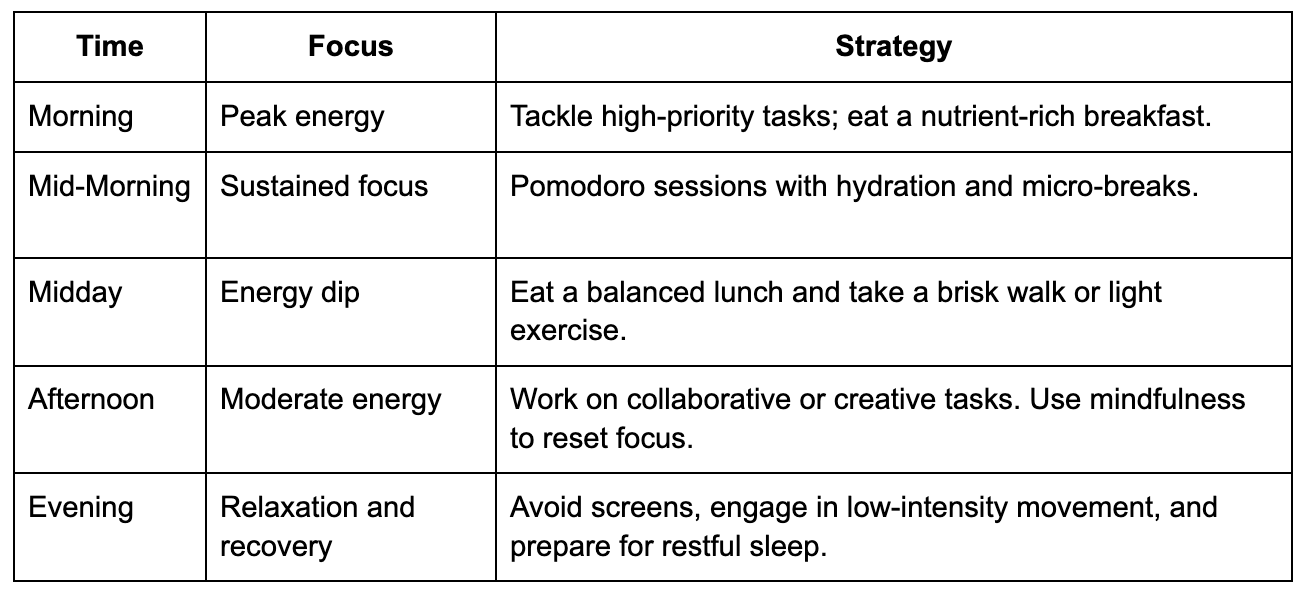The Energy Equation: Optimizing Your Day for Peak Performance
“Time management is important, but energy management is the key to peak performance.” – Tony Schwartz
We often try to optimize productivity by managing time, but true peak performance comes from managing energy. By aligning your physical, mental, and emotional energy with your goals, you can work smarter, sustain focus, and achieve more without burnout.
This issue explores the science of energy management and provides actionable strategies for optimizing your day through sleep, nutrition, and focus techniques.
The Energy Equation: A Framework
Peak performance is the result of optimizing three interconnected energy systems:
Physical Energy: Your body’s capacity for action, driven by sleep, nutrition, and movement.
Mental Energy: Your ability to focus, process information, and make decisions.
Emotional Energy: Your motivation, resilience, and overall mindset.
1. Sleep: The Foundation of Energy
Why Sleep Matters
Sleep is the foundation of physical and mental energy. During sleep, your brain consolidates memories, clears toxins, and restores neural connections, while your body repairs and recharges.
Key Science: The National Sleep Foundation recommends 7–9 hours of sleep per night for adults. Chronic sleep deprivation reduces cognitive function, decision-making, and emotional regulation.
Optimization Strategies:
Stick to a Schedule: Go to bed and wake up at the same time daily, even on weekends, to regulate your circadian rhythm.
Optimize Your Environment:
Keep your bedroom cool (60–67°F).
Use blackout curtains and reduce noise with earplugs or white noise machines.
Limit Sleep Disruptors: Avoid caffeine after 2 PM and reduce screen time an hour before bed to minimize blue light exposure.
Quick Tip: Use a sleep tracker like Whoop or Oura Ring to monitor sleep quality and identify areas for improvement.
2. Nutrition: Fueling Energy
The Science of Sustained Energy
Your energy levels are directly influenced by what—and when—you eat. Foods that stabilize blood sugar levels provide steady energy, while sugar-laden or highly processed foods lead to crashes.
Key Science: Low-glycemic foods (e.g., whole grains, vegetables, lean proteins) release energy slowly, preventing spikes and crashes in blood sugar.
Optimization Strategies:
Balance Macronutrients:
Include complex carbohydrates, healthy fats, and proteins in every meal.
Example: A breakfast of oatmeal, almond butter, and a boiled egg.
Hydrate Consistently: Dehydration reduces cognitive performance. Aim for at least 8 glasses of water daily.
Time Your Meals:
Start your day with a nutrient-rich breakfast to jumpstart metabolism.
Avoid heavy meals close to bedtime, which can disrupt sleep.
Quick Tip: Use apps like MyFitnessPal to track meals and ensure you’re maintaining a balanced diet.
3. Focus Techniques: Mastering Mental Energy
Why Focus Matters
Your ability to concentrate depends on managing mental energy effectively. Without structured breaks or techniques to sustain attention, energy levels drop, leading to diminishing returns.
Key Science: The Ultradian Rhythm suggests that humans can focus intensely for about 90–120 minutes before needing a break.
Optimization Strategies:
Adopt the Pomodoro Technique: Work in focused 25-minute intervals followed by 5-minute breaks to recharge.
Time Your Peak Productivity: Identify your peak energy windows (e.g., morning, afternoon) and schedule your most challenging tasks during those times.
Eliminate Distractions:
Turn off notifications on your devices.
Use tools like Focus@Will for productivity-enhancing background music.
Quick Tip: Pair focus sessions with short physical movement breaks, such as stretching or a quick walk, to re-energize.
4. Movement: Enhancing Physical and Emotional Energy
Why Movement Matters
Regular physical activity boosts circulation, oxygenates the brain, and releases endorphins that enhance mood and focus.
Key Science: Even 10 minutes of moderate exercise can significantly increase cognitive performance and reduce stress hormones like cortisol.
Optimization Strategies:
Incorporate Micro Workouts:
Use short exercise sessions (5–15 minutes) during breaks.
Example: 10 push-ups, 20 squats, or a brisk walk.
Schedule Regular Activity: Aim for at least 150 minutes of moderate aerobic activity weekly, as recommended by the CDC.
Use Active Recovery: Activities like yoga or stretching improve flexibility and reduce tension.
Quick Tip: Use fitness apps like Fitbit or Nike Training Club for guided workouts tailored to your schedule.
5. Emotional Energy: The Mindset Multiplier
Why Emotional Energy Matters
Your emotional state drives motivation and resilience. High emotional energy comes from positive relationships, mindfulness, and a sense of purpose.
Key Science: Gratitude practices and mindfulness meditation can rewire the brain to reduce stress and enhance focus.
Optimization Strategies:
Start with Gratitude: Spend 2 minutes daily writing down three things you’re grateful for.
Practice Mindfulness: Use apps like Calm or Headspace to integrate short mindfulness exercises into your routine.
Build Relationships: Regularly connect with supportive friends or colleagues to replenish emotional energy.
Quick Tip: Schedule a “gratitude break” at the end of your workday to reflect on wins and maintain a positive mindset.
The Energy Equation in Action
To integrate these strategies seamlessly into your day, align activities with your energy peaks and valleys:
Which area of your energy management—sleep, nutrition, focus, movement, or emotional well-being—needs the most attention? What small change can you implement today to optimize your performance?
Books:
The Power of Full Engagement by Jim Loehr and Tony Schwartz (on managing energy, not time).
Why We Sleep by Matthew Walker (on the science of sleep).
Atomic Habits by James Clear (on creating sustainable routines).
Apps:
Sleep Cycle: Tracks and improves sleep quality.
Zero: For mindful eating and intermittent fasting.
Focus@Will: Background music for focus sessions.
Articles:
“The Science of Energy Management” – Harvard Business Review
“How Movement Boosts Cognitive Performance” – Psychology Today
Energy, not time, is your most valuable resource. By optimizing your day through strategic sleep, nutrition, movement, and focus techniques, you can sustain peak performance while avoiding burnout.
Remember, small adjustments compound into lasting impact. What change will you make today to elevate your energy and unlock your potential?



